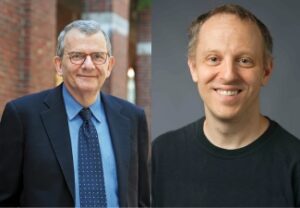
- This event has passed.
2024 Annual Toronto Graduate Philosophy Conference
Friday October 18, 2024 - Saturday October 19, 2024
Event Navigation

Join us for the 23rd Annual Toronto Graduate Philosophy Conference, with keynote speakers Ted Sider (Rutgers) and Samuel Scheffler (NYU).
The event will take place in two different venues: The Centre for Ethics (200 Larkin, 15 Devonshire Place) on Friday, October 18, and the Jackman Humanities Building 100 (170 St. George Street) on Saturday, October 19, 2024.
Program
Friday, October 18, 2024
| Time | Session Information |
| 8:45-9:00 | Breakfast (Centre for Ethics) |
| 9:00-12:20 | Session 1 (Centre for Ethics)
Chair: Josh Brecka, University of Toronto |
| 9:00-10:00 | On Why the Immorality Charge Generalizes: What Version of the Parfit Conditional Do You Accept?
Kacper Mykietyn, University of Toronto Commentator: Shahdah Mahhouk, University of Toronto |
| 10-10:10 | BREAK |
| 10:10-11:10 | In What Sense Is Courage Pleasant? Aristotle on ἀνδρεία
Luke Jennings, University of Oxford Commentator: Jason Singer, University of Toronto |
| 11:10-11:20 | BREAK |
| 11:20-12:20 | Toward a Theory of Epistemic Companionship
Yuan Tian, Harvard University Commentator: Marybel Menzies, University of Toronto |
| 12:20-1:30 | LUNCH (Centre for Ethics) |
| 1:30-3:40 | Session 2 (Centre for Ethics)
Chair: Gerald Teng, University of Toronto |
| 1:30-2:30 | Coincident Objects and Principles of Plenitude
Hwan Ho, Syracuse University Commentator: Hang Huang, University of Toronto |
| 2:30-2:40 | BREAK |
| 2:40-3:40 | Material Plenitude for Fineans
Antonio Freiles, Syracuse University Commentator: Patrick Fraser, University of Toronto |
| 3:40-4:00 | BREAK |
| 4:00-6:00 | KEYNOTE 1 – Ted Sider (JHB 100) |
|
Plenitude and Derivative Ontology Ted Sider, Rutgers University
|
Saturday, October 19, 2024
| Time | Session Information |
| 8:45-9:00 | Breakfast (JHB 100) |
| 9:00-12:20 | Session 3 (JHB 100)
Chair: Cameron Yetman, University of Toronto |
| 9:00-10:00 | Forgive, Because You Were Forgiven
Abraham Mathew, Massachusetts Institute of Technology Commentator: Jasmine Tremblay D’Ettorre, University of Toronto |
| 10-10:10 | BREAK |
| 10:10-11:10 | Do Merely Statistical People Have a Standing to Complain?
Stephanie Van Fossen, University of Southern California Commentator: Nate Oppel, University of Toronto |
| 11:10-11:20 | BREAK |
| 11:20-12:20 | Duty and Risk
Mitchell Barrington, University of Michigan Commentator: Ian Campbell, University of Toronto |
| 12:20-1:30 | LUNCH |
| 1:30-3:40 | Session 4 (JHB 100)
Chair: Faisal Bhabha, University of Toronto |
| 1:30-2:30 | How Protest Works, Even When It Doesn’t
Raye Ploeger, UNC Chapel Hill Commentator: Henry Krahn, New York University |
| 2:30-2:40 | BREAK |
| 2:40-3:40 | Polite Politics: Etiquette as the Realization of Human Dignity and Democratic Ideals
Helen Han Wei Luo, Columbia University Commentator: Jules Sheldon, University of Toronto |
| 3:40-4:00 | BREAK |
| 4:00-6:00 | KEYNOTE 2 – Samuel Scheffler (JHB 100) |
|
Existential Catastrophe, the Love of Humanity, and the Historicist Sensibility Samuel Scheffler, New York University
|
Keynote Speakers
Samuel Scheffler is a University Professor and professor of Philosophy and Law at NYU. He works mainly in the areas of moral and political philosophy and the theory of value. His publications include six books: The Rejection of Consequentialism (1982, rev. ed. 1994), Human Morality (1992), Boundaries and Allegiances (2001), Equality and Tradition (2010), Death and the Afterlife (ed. Niko Kolodny, 2013), and Why Worry about Future Generations? (2018), all published by Oxford University Press. He has received Guggenheim and NEH Fellowships, and has been a Visiting Fellow of All Souls College, Oxford. He is a fellow of the American Academy of Arts and Sciences, a member of the Royal Norwegian Society of Sciences and Letters, and a foreign member of the Norwegian Academy of Science and Letters.
Ted Sider is a Distinguished Professor of Philosophy and Andrew W. Mellon Chair at Rutgers University. He specializes mainly in metaphysics (time, identity, mereology, modality, supervenience, fundamentality). He also has research and/or teaching interests in philosophy of language, logic, philosophy of logic, philosophy of mathematics, and philosophy of physics. Recently he has been thinking about how the choice of conceptual tools for articulating metaphysical questions (e.g., modality vs. fundamentality vs. ground) affects how we answer those questions, especially questions about the metaphysics of science.
Please contact Yi-Cheng Lin or Sooyoung Moon with any questions about the conference.
SHARE
